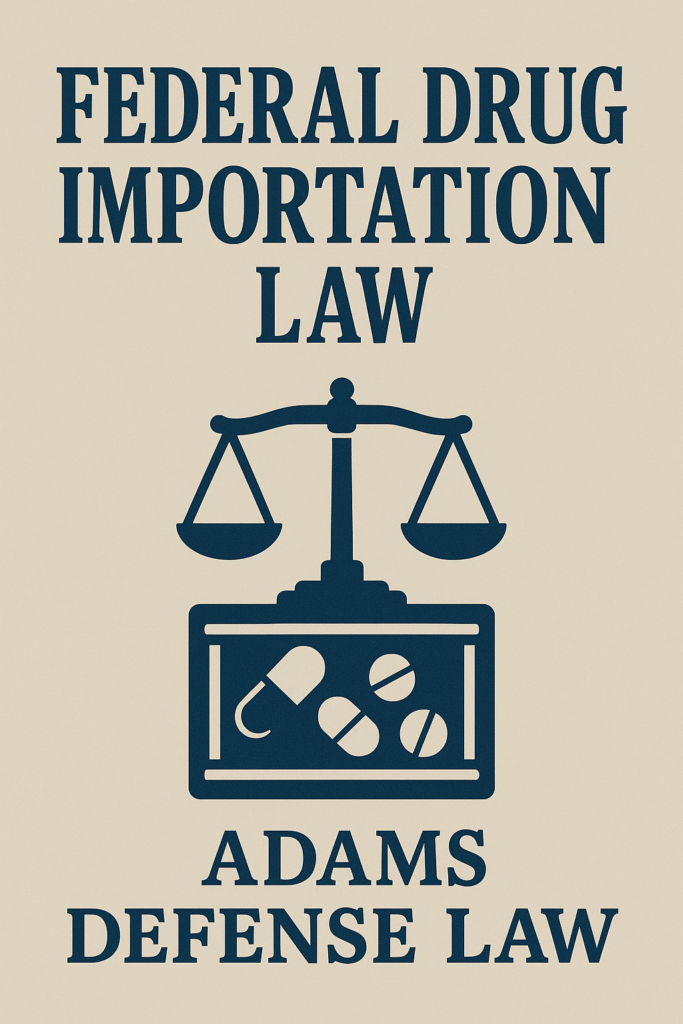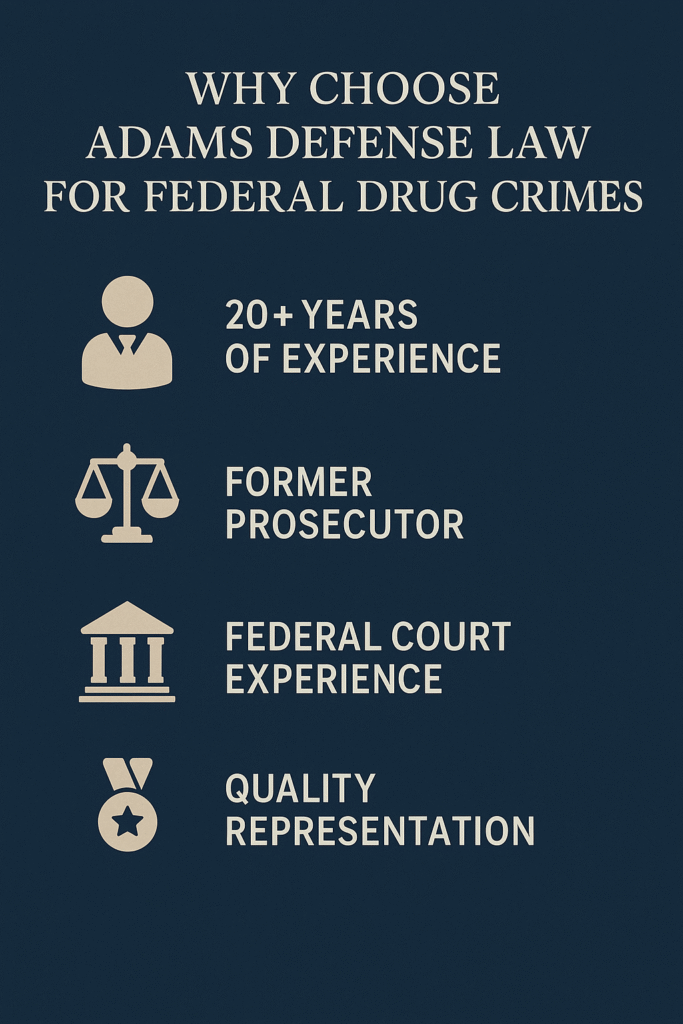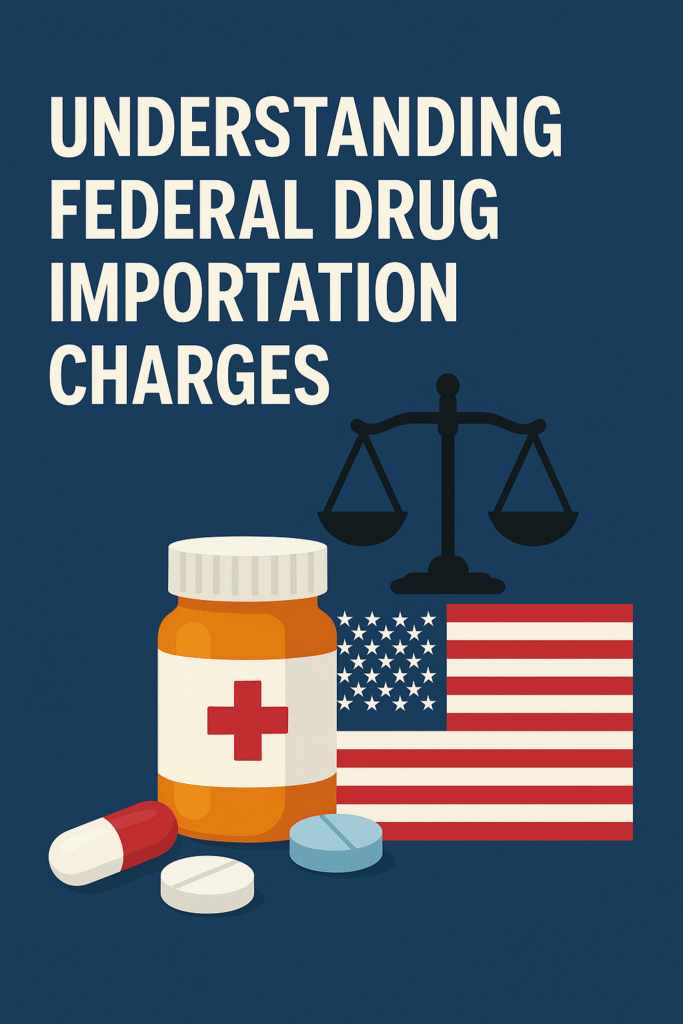Federal Drug Importation Law
Federal Drug Importation Attorney | Chicago, NYC, Kansas City
Experienced federal criminal defense lawyer providing aggressive representation for drug importation charges, including border cases, international trafficking, and customs violations.
Federal drug importation charges represent some of the most serious and complex offenses in the federal criminal justice system.
These cases involve the movement of controlled substances across international borders into the United States, triggering harsh federal penalties, extensive international investigations, and complex jurisdictional issues. Importation cases often involve multiple federal agencies, international cooperation, and sophisticated enforcement techniques that can ensnare individuals with varying levels of involvement.
Attorney Josh Adams at Adams Defense Law has extensive experience defending clients against federal drug importation charges in Chicago, New York City, and Kansas City.
Our practice focuses on challenging border searches, questioning international evidence, protecting constitutional rights, and navigating the complex intersection of criminal law, immigration law, and international treaties.
Call (312) 566-9173 for immediate consultation or complete our confidential case evaluation to discuss your federal importation charges.


Understanding Federal Drug Importation Charges
Federal drug importation is prosecuted under 21 U.S.C. § 952, which prohibits bringing controlled substances into the United States except as authorized by law. These charges carry some of the harshest penalties in federal criminal law and often involve complex international investigations coordinated between multiple countries and federal agencies.
Importation charges can arise from various scenarios:
- Physical transportation of drugs across international borders
- Mail and package shipments containing controlled substances
- Commercial importation schemes involving legitimate businesses
- Maritime and aviation smuggling operations
- International coordination of large-scale trafficking organizations
Elements of Federal Importation Charges
To prove federal drug importation, prosecutors must establish:
International Movement: The controlled substance was brought into the United States from a foreign country.
Knowledge: The defendant knew they were importing controlled substances and understood the illegal nature of their actions.
Lack of Authorization: The importation was not authorized by federal law or valid prescription.
Interstate Commerce: The importation affected interstate or foreign commerce, which is typically easy to establish in border cases.
Controlled Substance Identity: The imported substance is listed in federal controlled substance schedules.
Enhanced Federal Jurisdiction
Importation cases automatically fall under federal jurisdiction due to their international nature, often resulting in:
- Investigation by multiple federal agencies
- Coordination with foreign law enforcement
- Enhanced penalties compared to domestic drug offenses
- Complex extradition and international legal issues
- Broad forfeiture powers affecting international assets
Types of Federal Drug Importation Cases
Border Crossing Importation
Border crossing cases involve physical transportation of drugs across land borders, typically at official ports of entry or through remote crossing points.
Common Scenarios:
- Vehicle searches at border checkpoints revealing concealed drugs
- Pedestrian border crossings with drugs hidden on person or in luggage
- Commercial trucking operations used to smuggle large drug quantities
- Border tunnel operations for avoiding official inspection points
Typical Evidence:
- Physical seizure of drugs during border inspections
- Surveillance footage from border security cameras
- K-9 alerts and subsequent vehicle or person searches
- GPS tracking and communication intercepts
Defense Strategies:
- Challenging the legality and scope of border searches
- Questioning knowledge and possession elements
- Examining border patrol procedures and training
- Investigating potential Fourth Amendment violations despite border search exceptions
Mail and Package Importation
Mail importation cases involve shipping controlled substances through postal services or private shipping companies from foreign countries.
Investigation Methods:
- X-ray screening and physical inspection of suspicious packages
- Controlled delivery operations using undercover agents
- Coordination with foreign postal authorities and customs agencies
- Analysis of shipping records and payment methods
Common Challenges:
- Establishing defendant knowledge of package contents
- Proving intentional receipt rather than unknowing delivery
- Questioning chain of custody for intercepted packages
- Challenging search procedures for international mail
Defense Approaches:
- Challenging knowledge and intent elements
- Questioning controlled delivery procedures
- Examining international mail search protocols
- Investigating potential entrapment in controlled delivery scenarios
Maritime Drug Importation
Maritime cases involve smuggling drugs via boats, ships, or other watercraft, often in international waters before entering U.S. territorial waters.
Enforcement Techniques:
- Coast Guard interdiction of suspicious vessels
- International cooperation with foreign naval forces
- Radar and satellite surveillance of suspicious maritime activity
- Boarding and search of vessels in international and territorial waters
Legal Complexities:
- Jurisdictional issues regarding international waters
- Maritime law and treaty compliance
- Flag state jurisdiction and vessel registration issues
- International cooperation and evidence sharing agreements
Defense Strategies:
- Challenging maritime jurisdiction and vessel boarding authority
- Questioning international law compliance and treaty requirements
- Examining Coast Guard procedures and training
- Investigating weather conditions and navigation evidence
Aviation Drug Importation
Aviation importation involves using aircraft to transport drugs across international borders, ranging from commercial flights to private aircraft operations.
Common Methods:
- Commercial airline passengers with drugs in luggage or on person
- Private aircraft operations avoiding major airports
- Cargo shipments through commercial airlines
- Ultra-light aircraft and drone operations
Investigation Approaches:
- TSA screening and baggage inspection procedures
- CBP inspection of private aircraft and pilots
- Radar tracking and flight plan analysis
- Coordination with foreign aviation authorities
Defense Considerations:
- Challenging airport search and seizure procedures
- Questioning aviation authority and jurisdiction
- Examining TSA and CBP training and procedures
- Investigating flight records and pilot certifications
Federal Importation Penalties
Federal drug importation penalties are among the most severe in criminal law, often exceeding domestic drug offense penalties due to the international nature of the crimes.
Base Penalties by Drug Type
Cocaine Importation:
- Any amount: Up to 20 years imprisonment
- 500 grams or more: 5-year mandatory minimum
- 5 kilograms or more: 10-year mandatory minimum
Heroin Importation:
- Any amount: Up to 20 years imprisonment
- 100 grams or more: 5-year mandatory minimum
- 1 kilogram or more: 10-year mandatory minimum
Methamphetamine Importation:
- Any amount: Up to 20 years imprisonment
- 50 grams or more (pure): 5-year mandatory minimum
- 500 grams or more (pure): 10-year mandatory minimum
Fentanyl Importation:
- Any amount: Up to 20 years imprisonment
- 40 grams or more: 5-year mandatory minimum
- 400 grams or more: 10-year mandatory minimum
Marijuana Importation:
- Less than 50 kilograms: Up to 5 years imprisonment
- 50-99 kilograms: Up to 20 years imprisonment
- 100-999 kilograms: 5-40 years imprisonment
- 1,000 kilograms or more: 10 years to life imprisonment
Enhanced Penalties for Importation
International Trafficking Organizations: Importation as part of continuing criminal enterprise can result in 20 years to life imprisonment.
Firearms Involvement: Using firearms during importation operations adds mandatory consecutive sentences of 5 years to life.
Violence or Death: Importation resulting in death or serious bodily injury carries penalties up to life imprisonment.
Prior Convictions: Previous drug felony convictions double mandatory minimum sentences and can result in life imprisonment.
Large Quantities: Importation of massive drug quantities can trigger enhanced penalties and asset forfeiture proceedings.
Border Search Exception and Constitutional Issues
Border searches present unique constitutional considerations that differ significantly from domestic searches.
Border Search Authority
Routine Border Searches: CBP officers can conduct routine searches of persons, vehicles, and belongings without warrants or reasonable suspicion.
Non-Routine Border Searches: More intrusive searches, including strip searches and body cavity searches, require reasonable suspicion of criminal activity.
Extended Detention: Prolonged detention at borders requires reasonable suspicion and must be reasonable in scope and duration.
Electronic Device Searches: Searches of laptops, phones, and electronic devices at borders have evolving constitutional requirements.
Constitutional Challenges in Border Cases
Fourth Amendment Limitations: While border searches have expanded authority, constitutional protections still apply:
- Challenging the reasonableness of extended detention
- Questioning the scope and intrusiveness of searches
- Examining officer training and search procedures
- Investigating racial profiling and selective enforcement
Fifth Amendment Issues: Border interrogations and statements present constitutional challenges:
- Miranda requirements during custodial interrogation
- Coercive interrogation techniques and environments
- Language barriers and translation accuracy
- Immigration status threats and coercive questioning
Due Process Concerns: International evidence and procedures may violate due process rights:
- Reliability of foreign evidence and chain of custody
- International cooperation and evidence sharing agreements
- Extradition procedures and constitutional compliance
- Access to foreign witnesses and confrontation rights
International Cooperation and Evidence
Federal importation cases often involve evidence and cooperation from foreign countries, creating complex legal challenges.
Foreign Evidence Issues
Chain of Custody: Establishing reliable chain of custody for evidence obtained in foreign countries can be challenging:
- Foreign law enforcement procedures and training
- Evidence preservation and documentation standards
- Translation and interpretation of foreign documents
- Authentication of foreign laboratory reports and testing
Reliability Standards: Foreign evidence must meet U.S. reliability and constitutional standards:
- Foreign legal system due process protections
- Coercion and torture concerns in foreign investigations
- Hearsay and confrontation clause issues with foreign witnesses
- Authentication requirements for foreign documents and records
Treaty and International Law
Mutual Legal Assistance Treaties (MLATs): International cooperation agreements that facilitate evidence sharing:
- MLAT compliance and procedural requirements
- Dual criminality requirements for evidence sharing
- Specialty doctrine limitations on evidence use
- Foreign constitutional and legal system protections
Extradition Treaties: International agreements governing suspect transfer between countries:
- Extradition procedures and constitutional protections
- Political offense exceptions and humanitarian concerns
- Dual criminality requirements for extradition
- Foreign legal system human rights protections
Defense Strategies for Importation Cases
Defending federal importation charges requires specialized knowledge of international law, border procedures, and complex constitutional issues.
Challenging Border Procedures
Search and Seizure Issues: Even with expanded border search authority, constitutional violations can occur:
- Challenging the reasonableness of detention duration and conditions
- Questioning the scope of searches and investigative procedures
- Examining officer training and qualification for conducting searches
- Investigating selective enforcement and racial profiling issues
International Law Compliance: Border enforcement must comply with international legal obligations:
- Treaty compliance and international agreement requirements
- Foreign sovereign rights and jurisdictional limitations
- International waters and territorial boundary issues
- Aviation and maritime international law requirements
Knowledge and Intent Defenses
Lack of Knowledge: Importation charges require proof of defendant knowledge:
- Challenging assumptions about package contents or concealment knowledge
- Investigating controlled delivery procedures and defendant awareness
- Examining evidence of innocent explanations for defendant conduct
- Questioning witness reliability regarding defendant knowledge
Unwitting Importation: Defendants may unknowingly import drugs through deception:
- Investigating claims of deception by co-conspirators or third parties
- Examining evidence of legitimate travel or business purposes
- Challenging assumptions about defendant sophistication and drug knowledge
- Providing alternative explanations for defendant conduct and statements
International Evidence Challenges
Foreign Evidence Reliability: Evidence from foreign countries may be unreliable or unconstitutional:
- Challenging foreign law enforcement procedures and training
- Questioning translation accuracy and interpretation issues
- Examining foreign legal system protections and due process standards
- Investigating coercion or torture concerns in foreign investigations
Chain of Custody Issues: International evidence transfer creates chain of custody challenges:
- Documenting evidence handling and preservation in foreign countries
- Questioning international shipping and transfer procedures
- Examining authentication and documentation requirements
- Investigating potential evidence tampering or contamination
Working with Adams Defense Law
Immediate Response to Importation Charges
Emergency International Consultation: Importation charges often involve immediate detention and complex international issues requiring urgent legal attention.
International Legal Team Coordination: We immediately coordinate with international legal experts and foreign counsel when necessary to protect client rights.
Immigration Consequences Assessment: Importation charges carry severe immigration consequences requiring immediate evaluation and protection strategies.
Comprehensive International Defense
International Law Expertise: We work with international law experts who understand treaty obligations, foreign legal systems, and cross-border evidence issues.
Foreign Evidence Analysis: We thoroughly examine all foreign evidence, including laboratory reports, witness statements, and law enforcement procedures for constitutional and reliability issues.
Treaty and Jurisdiction Analysis: We analyze all international legal issues, including MLAT compliance, extradition procedures, and jurisdictional challenges.
Multi-Jurisdictional Representation
Federal Court Experience: Our extensive federal court experience across multiple jurisdictions allows us to effectively represent clients regardless of case location.
International Coordination: We coordinate with foreign counsel and international legal experts to ensure comprehensive representation across all jurisdictions.
Immigration Law Integration: We work with immigration attorneys to address the immigration consequences of importation charges and coordinate defense strategies.
Related Federal Drug Defense Services
Our importation defense practice integrates with our comprehensive federal drug crime representation:
Federal Drug Crimes Overview → – Understanding how importation charges fit within broader international drug enforcement priorities and prosecution strategies.
Federal Drug Trafficking Defense → – Importation cases often include domestic trafficking allegations requiring coordinated defense strategies addressing both international and domestic elements.
Federal Drug Conspiracy Defense → – International drug operations frequently involve multiple defendants and conspiracy charges spanning multiple countries and jurisdictions.
Federal Drug Manufacturing Defense → – Importation cases may involve precursor chemical importation for domestic manufacturing operations requiring specialized technical defenses.
Connection to State Drug Defense
Our federal importation defense builds on extensive experience with related domestic charges:
Chicago Drug Defense → – Understanding how international drug importation connects to local distribution networks and state-level enforcement.
Federal Agencies in Importation Investigations
U.S. Customs and Border Protection (CBP)
CBP serves as the primary federal agency for border drug enforcement:
- Border inspection and interdiction operations at all ports of entry
- Advanced screening technology including X-ray and chemical detection
- K-9 units for drug detection at border crossings
- Coordination with foreign customs agencies for international cooperation
Drug Enforcement Administration (DEA)
DEA coordinates international drug investigations and enforcement:
- International offices in major drug source countries
- Coordination with foreign law enforcement agencies
- Long-term international trafficking organization investigations
- International extradition and evidence gathering operations
U.S. Coast Guard
Coast Guard handles maritime drug interdiction and enforcement:
- High-seas interdiction of drug smuggling vessels
- Coordination with foreign naval forces for maritime enforcement
- Advanced radar and surveillance technology for vessel detection
- International waters enforcement and boarding authority
Immigration and Customs Enforcement (ICE)
ICE investigates immigration-related drug importation cases:
- Immigration violations connected to drug importation
- Document fraud and identity theft in drug cases
- International criminal organization investigations
- Deportation proceedings for non-citizen drug importation defendants
Time-Sensitive Importation Defense Considerations
Federal importation charges require immediate attention due to their international complexity:
International Evidence Preservation: Evidence located in foreign countries may be lost or destroyed without immediate action to preserve it.
Immigration Consequences: Non-citizens face immediate deportation risks requiring urgent immigration law consultation and protection.
International Legal Deadlines: Foreign legal systems may have different deadlines and procedural requirements affecting defense options.
Extradition Proceedings: International defendants may face extradition proceedings requiring immediate specialized legal representation.
Protect Your Future: Contact Adams Defense Law Immediately
Federal drug importation charges can result in decades in prison, permanent immigration consequences, and international legal complications. These complex cases require immediate attention from attorneys with international criminal defense experience.
Get immediate help:
- Call (312) 566-9173 for urgent consultation
- Complete our confidential case evaluation for comprehensive international case analysis
Attorney Josh Adams provides aggressive federal importation defense in Chicago, New York City, Kansas City, and federal courts nationwide. We understand the international complexities of importation cases and are available 24/7 for criminal defense emergencies involving international drug charges.
Don’t wait – international evidence and legal deadlines may be approaching. Contact us immediately to protect your rights and begin building your international defense against federal importation charges.
This information is provided for educational purposes and does not constitute legal advice. Federal drug importation cases involve complex international legal issues requiring specialized analysis. Case outcomes depend on specific international facts, circumstances, and applicable treaties.
Why Choose Adams Defense Law for Federal Drug Crimes
Proven Federal Court Experience
Attorney Josh Adams has extensive experience defending clients in federal court across multiple jurisdictions. This experience is crucial when facing the complex procedural and substantive challenges of federal drug prosecutions.
Multi-Jurisdictional Practice
With active practice in Chicago, New York City, and Kansas City federal courts, Adams Defense Law can provide consistent representation regardless of where your case is being prosecuted.
Comprehensive Case Investigation
We conduct thorough investigations of every case, including:
- Independent forensic analysis
- Expert witness consultation
- Investigation of law enforcement procedures
- Discovery of exculpatory evidence
Client-Centered Approach
We understand that federal drug charges can devastate individuals and families. Our approach focuses on:
- Clear communication throughout the process
- Realistic assessment of case strengths and weaknesses
- Exploration of all available defense options
- Preparation for trial when necessary

Contact Federal Drug Lawyers
Contact Our Federal Criminal Defense Attorney
If you’re facing federal charges or under federal investigation in Chicago, New York City, or Kansas City, time is critical. Federal cases move quickly once charges are filed, and early intervention can significantly impact your case outcome.
Call (312) 566-9173 for immediate consultation
Available 24/7 for:
- Federal arrests and detention hearings
- Grand jury subpoenas and target letters
- Federal search warrants
- Emergency federal court matters
Office Locations:
Chicago Office (Primary) Adams Defense Law
(312) 566-9173 info@adamsdefenselaw.com
Free Consultation: All federal criminal defense consultations are confidential and protected by attorney-client privilege.
Get Your Free Criminal Case Evaluation
Disclaimer: This website provides general information about federal criminal defense. It does not constitute legal advice and does not create an attorney-client relationship. Federal criminal cases are complex and fact-specific. Consult with an experienced federal criminal defense attorney for advice about your specific situation

